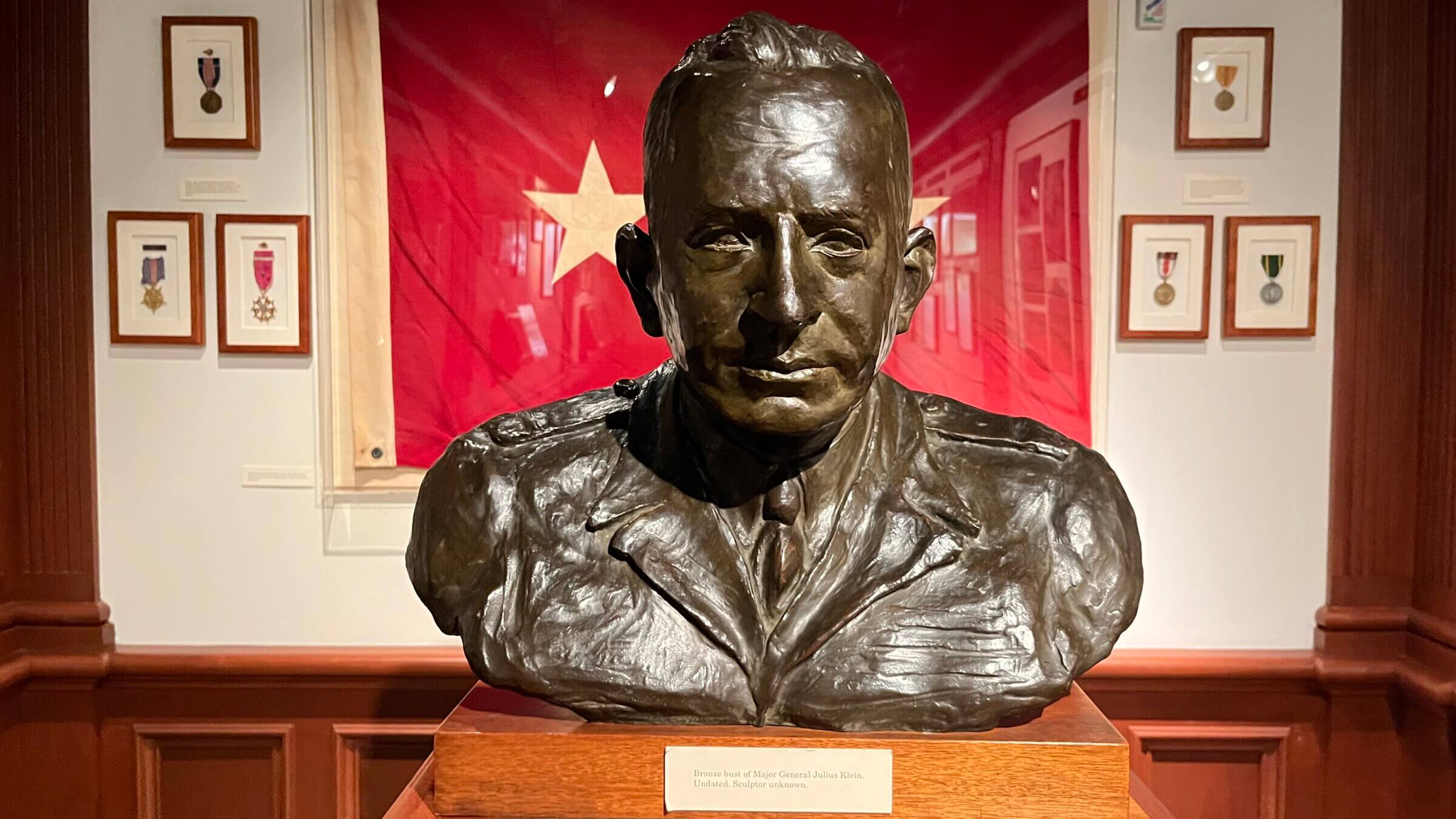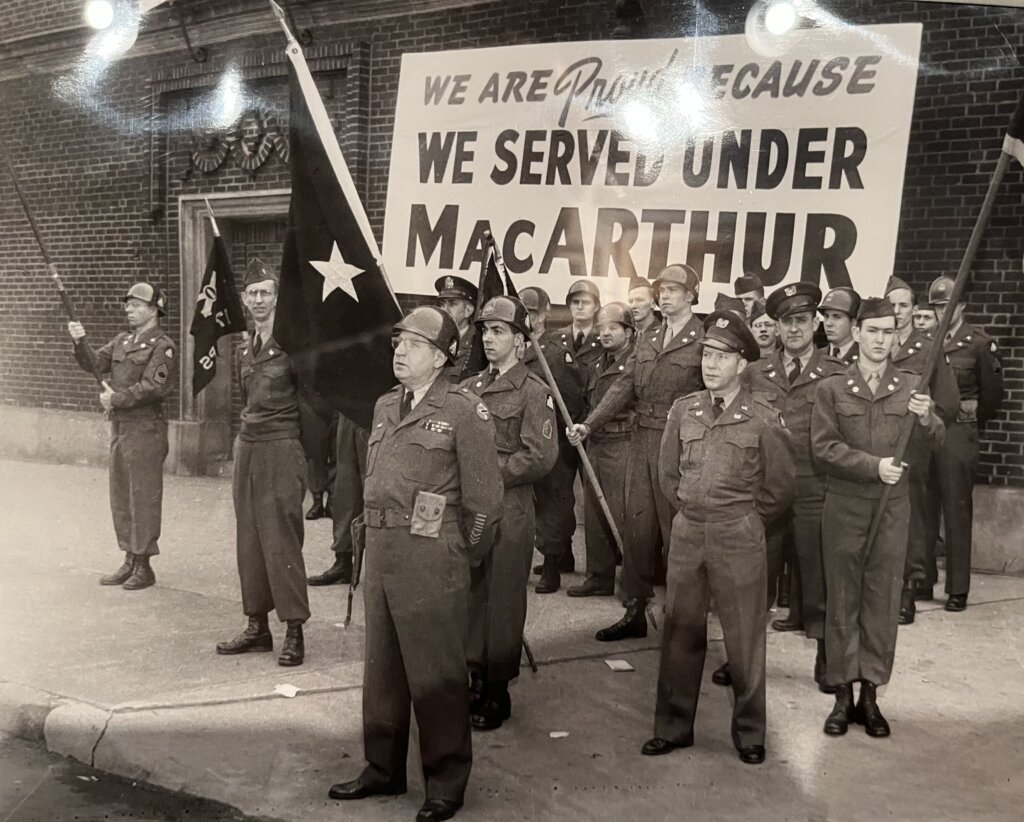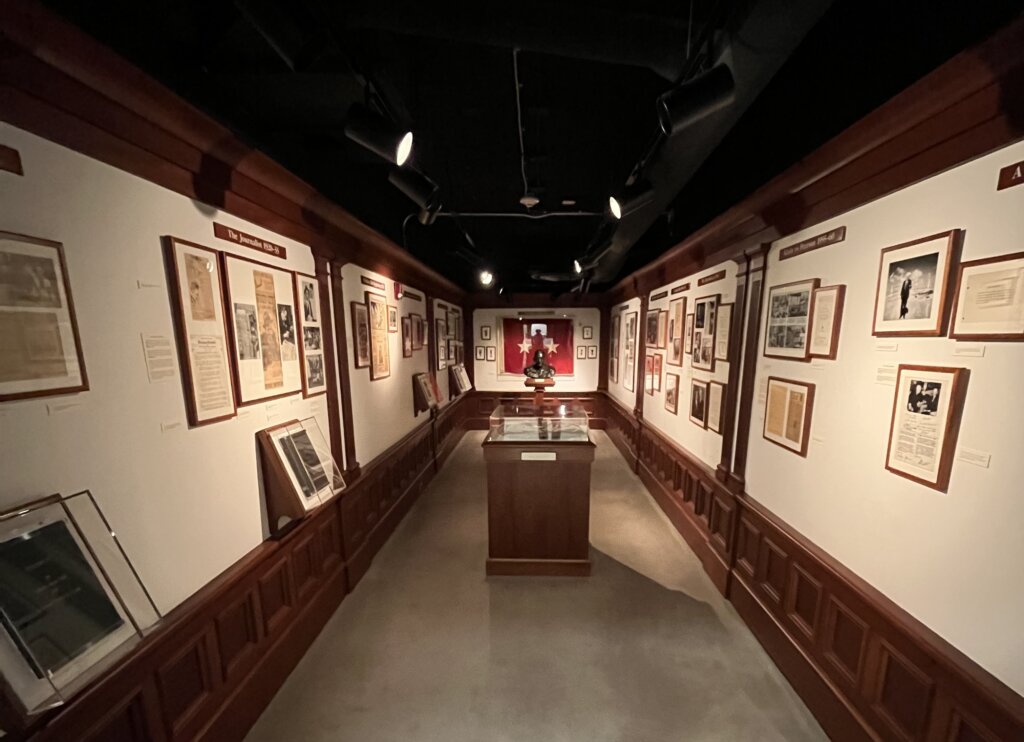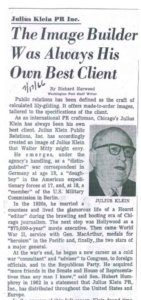He lobbied for Nazis — why does a Jewish museum honor him?
A longstanding tribute to Gen. Julius Klein at a Jewish military museum, funded by his family, raises eyebrows

A metal bust of Gen. Julius Klein is featured in a permanent exhibit about his life and career at the National Museum of American Jewish Military History. Photo by Arno Rosenfeld/The Forward
Michael Millenson was puzzled after stumbling on an exhibit about Gen. Julius Klein during a spontaneous visit to the National Museum of American Jewish Military History in Washington, D.C., this spring. The modest museum has devoted a room to Klein as one of its three permanent exhibits: “Major General Julius Klein: His Life and Work.”
The small, wood-paneled room is constructed almost like a shrine. It features a bust of Klein and his personal battle flag. Placards along the walls provide a fawning description of his colorful career.
“Julius Klein was a remarkable individual who achieved great heights as a soldier and a statesman,” the exhibit’s introduction reads.
Millenson, a Chicago healthcare consultant, knew perhaps more than most visitors about Klein. His father, Roy, briefly worked for Klein’s public relations firm in the 1950s and left with a sour taste in his mouth over his boss’s work to help German companies launder their extensive ties to the Nazi regime.
After distinguishing himself as an officer during World War II, Klein spent the 1950s and 1960s as one of the top American lobbyists for the West German government. This work included defending a former top Nazi official, and severely damaged Klein’s reputation at the time, forcing his resignation from the Jewish War Veterans of the United States — the very organization that operates the museum. But the exhibit glosses over this history in a few lines that don’t mention Nazism and attribute the controversy to a simple case of bad publicity — perhaps because the exhibit was essentially a gift of Klein’s estate.
Pamela Elbe, director of collections at the museum, said Klein left his personal archives and military memorabilia to the museum along with funding to display it following his death in 1984. The exhibit opened in 1991.
“Information on his work with West Germany is noticeably minimal,” Elbe said in an email interview. “The exhibition is well overdue for an update.”
But Elbe said that the museum has limited resources – two employees and an annual budget of less than $500,000, compared to more than $100 million at Washington’s Holocaust museum, for example – and was prioritizing other exhibits.
“As Klein is generally not a well-known figure,” she noted, “we have received very little feedback from visitors.”
Millenson lodged his complaint with the museum and also contacted the Forward. “It’s kind of, ‘Aren’t we proud of this Jewish guy?’” he said. “Other than the whole fact he’s helping people try to rehabilitate the reputation of proto-Nazis.”
A contested biography
The museum, in Washington’s DuPont Circle neighborhood, is free to visit, and consists of two floors in a building that also houses the headquarters of the Jewish War Veterans. Its top floor features a modern exhibit on the various U.S. conflicts that Jewish soldiers have fought in. The basement level is more dated and includes the Klein exhibit, a hall honoring Jewish recipients of the Medal of Honor, and a handful of other displays and research terminals.
The details of Klein’s biography are murky. The exhibit says he was born in Chicago in 1901 before relocating with his family to Germany, where he may – or may not – have worked as a journalist and even as an American spy during World War I. Klein returned to the Midwest following that war, and joined the Illinois National Guard. He worked for a series of newspapers and dabbled in politics before relocating to Hollywood in the 1930s.

He enlisted in the Army in 1941, the exhibit says, and used his media expertise to craft a manual on psychological warfare. Klein climbed the ranks and by 1955 he had been promoted to major, according to the exhibit, although a Washington Post article said the governor of Illinois awarded him the National Guard rank as a political favor.
During the 1950s, Klein somehow became connected to leaders of both the Israeli and West German governments and helped establish diplomatic relations between the two countries. David Ben-Gurion, Israel’s first prime minister, wrote kind letters to Klein, and the exhibit includes a photo Ben-Gurion signed to him “in deep friendship.”
Klein also became close with several members of Congress, including Sen. Thomas J. Dodd of Connecticut. He used these relationships to lobby on behalf of a series of West German interests, according to both news coverage at the time and an extensive description of Klein’s activities in a 2007 book chapter by Jonathan Wiesen, a scholar of modern German history at the University of Alabama at Birmingham.
Some of those interests had clear, direct connections to Nazism. Some of his clients had been Nazis themselves. Klein’s contracts with them proved lucrative.
Work for Nazi figures
The Society for German-American Cooperation, a group of West German politicians and businessmen, paid Klein $150,000 per year — $1.6 million in today’s dollars — beginning in the 1950s to promote the interests of companies like IG Farben, which produced the cyanide gas used to murder Jews during the Holocaust. The chemicals conglomerate also operated a rubber factory at Monowitz, a Nazi slave labor camp opened near Auschwitz at the company’s behest.
While the depth of German industry’s complicity in Nazi crimes did not gain widespread attention until the 1980s, Klein’s work was deeply controversial even at the time. He defended German companies during mediation with the Claims Conference, which was seeking restitution for victims of the Holocaust, and he sought to polish the image of Hans Globke, a West German official who had helped implement antisemitic policies at the Office for Jewish Affairs during the Nazi regime.

Globke became Klein’s “closest confidant” in Germany, according to Wiesen’s book chapter, and Klein convinced Dodd to deliver a 1960 speech on the Senate floor defending Globke and other former Nazi officials serving in key roles in the West German government.
“It’s puzzling that he really went to bat for these former Nazis,” Wiesen said in a recent interview. He said that he, like Millenson, was struck that the most controversial aspects of his career have received such little attention in the museum exhibit when he visited it as part of his research.
Broadly, he said, Klein is not well known: “He’s gotten away with some bit of anonymity.”
Backlash
He did not get away with it at the time. Klein’s work for the Germans drew the ire of both Jewish groups and government officials in the 1950s. He was forced to resign as a member of the Jewish War Veterans organization, which he had served as president in 1947, after Drew Pearson used his nationally syndicated Washington Merry-Go-Round column to take Klein to task.
Pearson claimed that “a free-spending German lobby” had enlisted Klein to “work with Hitler’s former financier,” the banker Hermann Abs, and to convince the White House to pay Germany $125 million as compensation for property seized during the war.
“Klein is an influential gentleman with friends in high places,” Pearson wrote in 1958. “He sold Secretary John Foster Dulles on the phrase ‘sanctity of private property’ which President Eisenhower later used in describing the new policy for the payment of German property.”
The exhibit includes a yellowed copy of Pearson’s column, but the caption refers to it as “controversial” and the accompanying placard is defensive of Klein. It says Klein supported returning German property in order to “energize West Germany’s allegiance in the fight against communism.”
“Julius Klein continued to believe that by helping Germany he was helping the United States even more,” the exhibit text states. “Klein was not swayed from what he believed was right.”
Interrogating the ‘Image Builder’
Klein was eventually hauled before a Senate ethics committee over his relationship with Dodd, and a Washington Post exposé in 1966 questioned elements of Klein’s purported biography.
“The Image Builder Was Always His Own Best Client,” the Post headline declared.
The article asserted that Klein’s claim to be a “war correspondent” during World War I amounted to writing a single article for his German high school newspaper, although Klein had said he was writing for Chicago newspapers. The museum exhibit includes a German press card apparently granted to Klein when he was 13 years old.

The exhibit also describes Klein having had “a very successful career as a journalist,” saying he served as editor of a chain of Hearst-owned German newspapers and wrote investigative pieces that “contributed greatly” to the downfall of Chicago gangster Al Capone.
But the 1966 Post article said Klein actually worked as a “promoter,” overseeing stunts to boost newspaper sales. It cited sources who disputed Klein’s claim, repeated in the museum, that hostile political leaders had disbanded his National Guard unit to sanction him for supporting Gen. Douglas MacArthur, who had recently been fired.
“Klein insisted that he was being punished for expressing his loyalty towards MacArthur,” the exhibit states next to a photo of Klein wearing a helmet and standing with a ragtag group of National Guard soldiers under a banner praising MacArthur.
In the Post story, Illinois National Guard Gen. Harry Bolen called Klein’s version a “damned lie” and said his air unit “couldn’t shoot at a kid’s box kite.”
“We need (that unit) like I need a damned buggy whip on my jeep,” Bolen said. “That kind of man is dangerous and we can’t have him in the Illinois National Guard and I threw him out.”
Wiesen said that despite the controversy over Klein’s work while he was alive, he remains a relatively unknown figure even among scholars. He said that it might be possible to understand Klein’s work for former Nazis as part of his strident anti-communism; by cozying up to West Germany, Klein believed the United States could keep Soviet influence at bay.
Klein did not have any children, according to his New York Times obituary, and his siblings, William and Gisella, both died in the 1980s, according to genealogical websites. But one of the few places where Klein’s legacy has been preserved – the basement of a Jewish museum in Washington – does little to unpack his complicated life.
“I remember thinking when I went to the museum that this is an odd little space for this strange kind of figure: Republican-Jewish-Illinoisan-Spy-Lobbyist-for-Germany,” Wiesen recalled. “I just felt like there was something I’m not getting.”





















